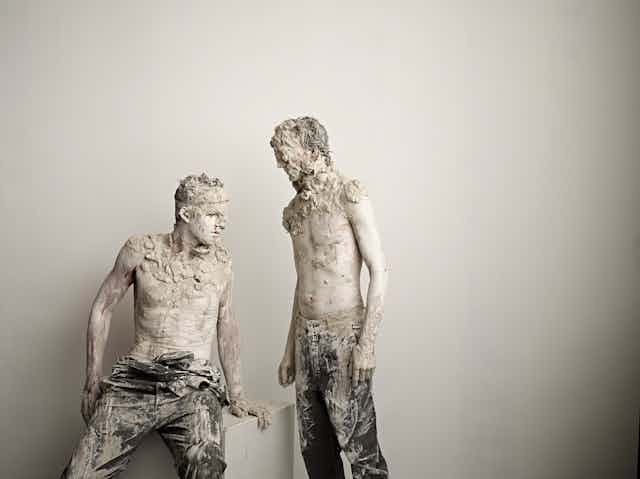David Malouf, writing about his libretto for the 1986 opera adaptation of Patrick White’s novel Voss, observed:
No libretto can reproduce the novel from which it is drawn. A novel, especially a great one, is itself: unique, irreplaceable. The best a libretto can do is reproduce the experience of the book in a new and radically different form, allowing the form itself to determine what the experience will be.
Of course this is true, but the role of the librettist in opera is an undervalued one, and Malouf has “form” on both sides of the equation – as an outstanding librettist and as a novelist whose work has been turned into a libretto.
Sydney Chamber Opera’s production of Malouf’s 1982 novel Fly Away Peter opens this weekend.
Just as in the adaptation of fiction into film, so too there is a “fidelity” debate around the losses a work of fiction is perceived to sustain when it is turned into an opera.
Those two art forms, fiction and opera, would seem distant, but in some ways opera is closer to fiction that it is to its more obvious cousin, spoken drama. The orchestra in opera functions as a form of omniscient narrator, capable of providing the audience with information about and insight into a character that is not possible in drama. This sense of interiority is as essential a component of opera as it is in fiction.
So have there been many successful operatic adaptations of Australian fiction into opera?
Malouf’s adapation of White’s 1957 novel Voss, with music by Richard Meale, set the bar very high. Hailed at its premiere in 1986 as the “Great Australian Opera”, it has overshadowed many subsequent works.
The fluid sense of time and space in the novel translated well into opera with its similar spatiotemporal qualities. The dreams and visions in which many of the events in the novel occur are represented very effectively in the opera. Meale and Malouf engaged critically with aspects of the novel, but within the prism of the 80s rather than the 50s.
There was an impetus before 2010 to have a new production coinciding with the centenary of the birth of Patrick White, but unfortunately nothing eventuated; however, Victoria Opera’s artistic director Richard Mills recently mentioned the possibility of a new production.
On a much smaller scale was Jonathan Mills’s 1996 version of the Barbara Bayton short story The Chosen Vessel (1896), which became The Ghost Wife with libretto by the poet Dorothy Porter.
Baynton’s bleak story, debunking the dominant male myth of the noble bushman, was translated into a confronting music theatre work which depicted the growing terror of “The Woman” – given a mesmerising incarnation by Dimity Shepherd – threatened by “The Swagman; decidedly not the jolly figure from Waltzing Matilda. This work, after performances in Melbourne and Sydney, had a well-regarded run in London.
Also on a small scale was Andrew Schultz’s 2008 version of Helen Garner’s short novel, The Children’s Bach (1986). A poetic and elusive work, it translated very effectively into a lightly-scored and evocative chamber opera which took the central metaphor of the fugue from the novel.
This became a meditation on the messiness and complexity of human relationships, one given a sense of structure by music.
Surprisingly, as possibly Australia’s most celebrated living writer, only one work of Peter Carey’s has been adapted, the 1981 novel Bliss. It received an overwhelmingly positive reaction when premiered in Sydney in 2010, with a similarly positive reception in Melbourne, Edinburgh, and then in a new production in Hamburg, conducted by one of the instigators and great supporters of the work, Simone Young.
Like Voss, it was one of the very few Australian operas to be broadcast on television.
If anyone might be said to rival Carey in the "Great Writer” stakes in Australia, then it is Tim Winton. The operatic version of his Booker-shortlisted novel The Riders (1994), by Iain Grandage and Alison Croggon, enjoyed a very positive reception in Melbourne in 2014 and last week won a Green Room award.
Winton’s novel, with its absent central character of Jennifer, presents challenges to adapters, but Grandage’s eclectic score, interspersed with a variety of bird calls, captured the musical soundscapes of the frantic journey through Europe by Scully and his daughter Billie in search of Jennifer.
She, in the opera, accompanies them throughout, as a strong vocal and musical force, if not as a real physical presence.
So we return to David Malouf and his early novel, Fly Away Peter. The operatic version by the Sydney Chamber Opera is being premiered within a week of the centenary commemoration of Gallipoli.
A standard school text, the novel is a lyrical evocation of south east Queensland on the eve of the war, and later shifts to the full horror of the trenches. Composer Elliott Gyger, and librettist Pierce Wilcox, have transformed the set pieces of the novel into eight scenes which have the three singers playing a panoply of different characters. The premiere is eagerly anticipated.
Rather than overwhelming operatic adaptors, these works of fiction have inspired a creative and innovative response from a range of composers writing in a variety of musical idioms. One hopes there are more on the way.
Sydney Chamber Opera’s production of Fly Away Peter opens on May 2. Details here.

